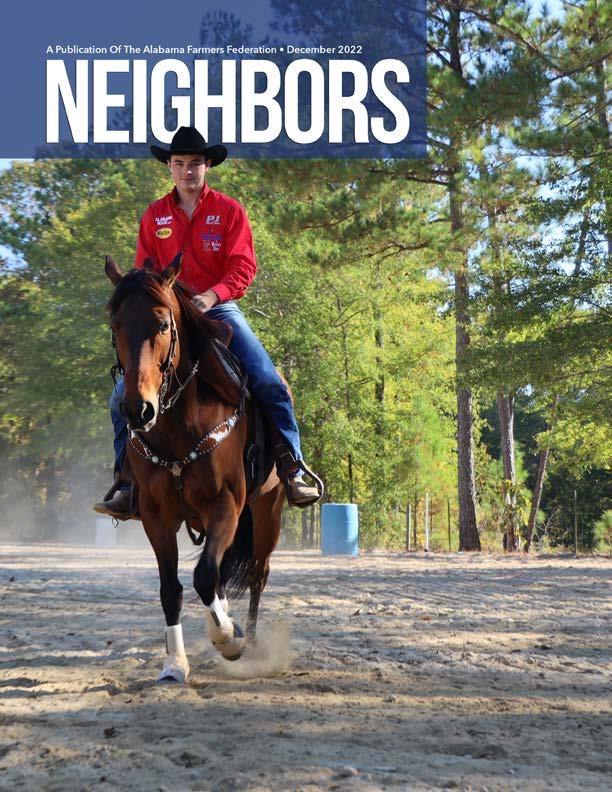
Priester’s Pecans is owned and operated by a farming family in Fort Deposit, Alabama. Our gourmet pecan products are made with high-quality ingredients, and premium-crop pecans we hand select from growers across the South.































































































































When you shop with us, you’re not only supporting farming families, you’re also supporting more than 100 of the finest folks in the Fort Deposit area.
These employees are the reason we proudly claim the motto “Made With Love in the South.” We couldn’t do what we do without them. So thank you all, from the bottom of our hearts, for your business and for making our family tradition a part of yours for over 85 years.
SCAN THE QR CODE TO SHOP OUR ONE POUND HOLIDAY BAGS OR VIEW OUR ENTIRE GOURMET GIFT COLLECTION. PRIESTERS.COM 1.866.477.4736 |
Merry Christmas to you and yours! FROM THE ENTIRE ELLIS FAMILY AND EVERYONE HERE AT PRIESTER’S PECANS
ALABAMA FARMERS FEDERATION

Paul Pinyan Executive Director
Jeff Helms | Director of Communications
FEDERATION OFFICERS
Jimmy Parnell | President, Stanton
Rex Vaughn | Vice President | North, Huntsville
Jon Hegeman Vice President | Central, Anniston
George Jeffcoat Vice President | Southeast, Gordon
Jake Harper | Vice President | Southwest, Camden
Steve Dunn Secretary-Treasurer, Evergreen
DIRECTORS
Dorman Grace | Jasper
Mark Byrd | Danville
John Bert East Leesburg
Steve Lake | Vinemont
Joe Anders Northport
Phillip Hunter | Birmingham
Joe Lambrecht | Wetumpka
Jimmy Holliman Marion Junction
Bill Cook Montgomery
Trip Horne | Louisville
Mark Kaiser | Seminole
Thomas Adams Newville
Lydia Haynes | Cullman
Mitchell Henry | Moulton
Neighbors (ISSN 0162-3974) is published monthly by the Alabama Farmers Federation, 2108 East South Boulevard, Montgomery, Alabama 36116 or (334) 288-3900. For information about Alabama Farmers Federation member benefits, visit the website www.alfafarmers.org. Periodicals postage paid at Montgomery, Alabama, and additional mailing offices. Printed in the U.S.A.











POSTMASTER





Send address changes to Neighbors P.O. Box 11000, Montgomery, Alabama 36191-0001

MEMBERSHIP AND SUBSCRIPTION CHANGES
800-392-5705, Option 4 or BWatkins@alfafarmers.org
ADVERTISING REPRESENTATIVE

Ben Shurett, (256) 997-7922 BenShurett.alfafarmers@gmail.com


DISCLAIMERS: Advertisements in Neighbors do not represent an endorsement by the magazine or Alabama Farmers Federation. Editorial information from sources outside the Alabama Farmers Federation is sometimes presented for our members. Such material may, or may not, coincide with official Alabama Farmers Federation policies. Publication of information does not imply an endorsement by the Alabama Farmers Federation.


www.AlfaFarmers.org

A member of American Farm Bureau Federation December 2022 | Volume 47 | Number 12
Marlee Moore | Editor Laura Unger | Graphic Designer
EDQM 4 In This Issue 4 | Federation Honors Wysner For Service To Agriculture 9 | New Economic Developer To Focus On Forestry 13 | Ag Law & You: Foreign Ownership Of Land 14 | Auburn Celebrates Alfa Farmers Collaborations 26 | How To Keep Poinsettias Merry And Bright 17 On The Cover
36 | Festive Holiday Treats 36 26 alfafarmers.org December 2022 | NEIGHBORS | 3
Russell County barrel racer Noah Mills won the National Barrel Horse Association Teen World Championship earlier this year, clocking 14.6 seconds with bay quarter horse Deuce. Photo By Marlee Moore
Federation Honors Wysner For Service To Agriculture
By Marlee Moore
Dean Wysner spent two decades crisscrossing the Alabama Farmers Federation’s Central Area, breaking bread with producers and bringing their
beliefs back to the organization’s state board.
That commitment earned Wysner the Service To Agriculture Award, the organization’s highest honor. He’ll receive the award during the Federation’s 101st annual meeting in Montgomery Dec. 5.
“This is a great honor for me and my family,” said Wysner, 76. “It’s probably as big an honor as I’ve ever received. The people I served did much more for me than I ever did for them.”
Wysner, a Randolph County poultry and cattle farmer, was first elected Central Area vice president in 1999. Wysner took a hands-on approach to the role, making it a priority to visit each of his 17 counties at least three times annually to provide in-depth reports on Alfa Insurance, political races and pressing agricultural issues.
“I wanted my counties to be informed,” he said. “But I never told them we were going to do something. I asked what they wanted us to do.”
Wysner’s late wife, Angie, was his traveling companion, often joining him

for visits like the 12-hour round-trip journey from their Woodland home near the Georgia line to Mississippi border counties. Angie died in January.
“I wanted us to be at every meeting when the first person showed up,” Wysner said. “I met a lot of good people all over the state. The Federation is just a big family.”
Federation President Jimmy Parnell served with Wysner on the state board as a district director in the early 2000s before Parnell was elected president in 2012. The Chilton County logger and cattle farmer said he is proud to call Wysner his friend.


“Dean’s deep desire to spend time with our people changed our vice presidents’ approach to serving members,” Parnell said. “We cannot overemphasize the amount of time he and Angie spent on the road traveling to be with their fellow farmers. Their service and love for this organization is still felt today, and we are pleased to honor Dean with this award.”
The son of a sharecropper, Wysner helped his father tend cotton and corn
Former Central Area Vice President Dean Wysner will receive the Alabama Farmers Federation’s highest honor, the Service To Agriculture Award, Dec. 5.
4 | NEIGHBORS | December 2022 alfafarmers.org
Wysner enjoys spending time on his farm near Woodland with his grandchildren and greatgrandchildren, like Easton Adair.
Clockwise from right: The Wysner family knows the importance of family time and often gathers to celebrate milestones; during his tenure leading Alabama, Gov. Bob Riley selected Dean Wysner to serve on national committees, where he eventually testified before Congress on agricultural issues; Dean and Angie Wysner had three children, Deana, Chad and Lori; the Wysners were married for more than 50 years and built a network of close friends and family within the Alabama Farmers Federation.

with mule-drawn machinery when he was 12 years old. After Wysner’s two years in the U.S. Army and work in the textile industry, he and Angie built commercial layer hen houses.
Wysner’s Federation foundation was laid when he revived the local Young Farmers program in the early ‘70s. Subsequent leadership training and a desire to solve problems evolved into serving in every official capacity on the Randolph County Farmers Federation (RCFF) board.

Two nine-year stints on the State Beef Committee fortified Wysner’s network of farmer-friends and grew his involvement.
“I’ve always had a yearning to be part of the decision-making philosophy,” said Wysner, who testified nationally before Congress on agricultural issues and served on advisory and policy committees for the Federation. “If we
have a problem, I want to solve the problem.”

During his tenure as vice president, Wysner was a stalwart champion of Federation members and staff. He also helped build the framework for the Federation to rejoin the American Farm Bureau Federation (AFBF), a multi-year process completed in 2004.
“That was the biggest achievement we had while I served,” he said. “After we rejoined, we were able to share our philosophy with other states and make AFBF stronger.”
Wysner, who retired from the commercial layer hen business, still raises cattle and spends time with his
daughter, Deana; three grandchildren; and two great-grandchildren. He and Angie lost daughter Lori to leukemia in 1996; their son, Chad, died from cancer in 2016.

He’s still serving farmers, too, as RCFF president and a member of local boards.
“I’m still involved for the same reason I got started. The Federation is the group that makes decisions as far as agriculture goes,” he said. “My part has changed, but I still want to be a part. It’s the best ag organization in the state without a doubt. We do more for agriculture than anyone else, and I’m proud to be part of that.”
alfafarmers.org December 2022 | NEIGHBORS | 5
Bird Is The Word: Poultry Technology Helps Farmers Grow
By Maggie Edwards
In a joint effort among the Alabama Farmers Federation, Alabama Poultry & Egg Association (APEA) and National Poultry Technology Center (NPTC), almost 50 poultry growers stepped away from the farm and gathered in Auburn Oct. 25 to fine-tune tricks of the trade.


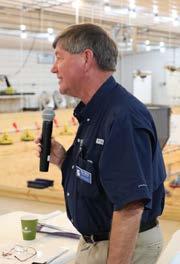

Larry Upchurch, a Clay County poultry farmer, said he learned the importance of generator care and upkeep during the day-long session at NPTC’s demonstration chicken house.
“During the generator care demonstration, I learned the value of having someone other than myself trained to manage the farm and equipment so I can rest easy when I’m away from home,” Upchurch said.
The meeting’s major focus was to encourage producers to understand, analyze and prepare their equipment — and teach cost-effective methods to help farmers stay in business.
“We learned about the importance of checking water panels, fans and heaters,” said poultry producer Jeff Maze, the Blount County Farmers Federation president. “Things must work the way they are intended to. If a heater is not burning efficiently, we are still paying the same amount of money for the gas brought into the house, but we are not getting the same output. That costs us money.”
The seasonal training allows poultry farmers to learn from and interact with industry professionals through hands-on experiences.
“Ultimately, we just want to give that chicken the best care we can give it while utilizing cost-effective methods,” Maze said. “There is always something new in the poultry industry, so I’m thankful NPTC strives to help us and our bottom line.”
New and seasoned farmers found value in techniques taught by NPTC staff
and APEA’s Ray Hilburn. Topics included efficiency when using fans, heaters, water, electricity and composting.
These topics are critical for farmers such as Maze and Upchurch. Alabama’s poultry industry has a $15 billion annual economic impact and ranks second in the nation in broiler, or meat chicken, production.
“We might know these things, but sometimes we need a reminder,” Upchurch said. “It’s good to brush up on things and take them back home to share. We are fortunate to have events like this in our state.”
Clockwise from left: Crenshaw County Farmers Federation President Tony Beck, Blount County Farmers Federation President Jeff Maze and other growers practiced checking fan rotations per minute to ensure efficiency; NPTC’s Jeremiah Davis shared information about heater systems with farmers such as Larry Upchurch of Clay County; APEA’s Ray Hilburn focused on composting during his presentation.
6 | NEIGHBORS | December 2022 alfafarmers.org
Poultry farmers from across the state gathered in Auburn at the National Poultry Technology Center (NPTC) Oct. 25 for a producer training session hosted by the Alabama Farmers Federation, Alabama Poultry & Egg Association and NPTC.




8 | NEIGHBORS | December 2022 alfafarmers.org
Grassroots Concept Fuels Forest Economic Development Hire
By Marlee Moore
Thanks to a grassroots push from the Alabama Farmers Federation, the state has a new economic development specialist focused on growing the $4 billion-plus forest products industry.
Al Jones joined the Alabama Forestry Commission (AFC) Oct. 17. In his first two weeks, Jones fielded calls from five potential forest products businesses interested in Alabama — and its mass of raw materials available thanks to the state’s 23 million acres of timberland.
“The potential is so much greater than what we’re doing,” Jones said. “I want to see our industry expand, see landowners get more for their timber and put out more products made in Alabama.”
The Federation’s State Forestry Committee originally conceived the economic development position to bring industry to the state, ultimately helping forest landowners better market their timber. According to the Forest Inventory Analysis (FIA), Alabama plants 1.57 trees for every tree harvested,
generating a surplus of quality wood.
Multiple departments within the Federation helped make the economic development specialist position a reality. That included External Affairs pushing the line item through the Legislature during the 2022 Regular Session and the Governmental & Agricultural Programs Department helping draft language for the role.
“Creating this position was a team effort,” said Federation Forestry Division Director William Green. “It started at the ground level with an idea from our members. Al’s work will pay real dividends for those landowners and the next generation of property owners.”
Jones brings decades of economic development experience and enthusiasm to AFC. He previously worked as Alexander City’s community development director following years with the Alabama Department of Economic and Community Affairs,

where he developed a passion for increasing Alabamians’ quality of life.
“The measure of success to me is the number of jobs created,” Jones said. “If you’re not creating jobs, you’re not making the whole of Alabama that much better.”
As AFC’s economic developer, Jones will work with the Federation, local developers, the governor’s office and partner agencies to recruit new businesses or expansions.
Jones hit the ground running in October, developing a deep understanding of Alabama forests’ capabilities and the in-depth needs of forest products businesses. That single-minded focus will be a boon for Alabama, said AFC’s Dan Chappell.

“Some landowners manage their forests without income in mind, but most landowners depend on some timber revenue to make things happen on their property,” said Chappell, AFC’s Management Division assistant director. “Better markets will give landowners more opportunities to sell their forest products. In turn, they will reinvest that money in the land and make sure we have sustainable, well-managed forests.”
State Forester Rick Oates thanked the Federation for promoting the idea of a full-time economic development specialist.
“Creating this position is a great step toward helping improve markets for Alabama’s landowners,” Oates said. “Al’s work will have a positive impact, not only on the economy of the state, but also on the health of our forests.”
Jones’ approach to economic development tag-teams relationshipbuilding and number-crunching. He’s already gathering reports, graphs and charts detailing timber available for prospective projects.
“Alabama has such an availability of materials,” Jones said. “We provide that information and try to convince prospective industries what we already know: Alabama is the place they need to be.”
Jones
alfafarmers.org December 2022 | NEIGHBORS | 9
Al Jones, left, brings decades of economic development experience to the Alabama Forestry Commission. His work will ultimately help landowners, such as Federation State Forestry Committee member David Wright of Dallas County, have more diverse options to market their timber.
Farm-City Shines Light On Importance Of Agriculture

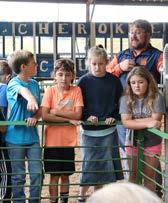 By Maggie Edwards
By Maggie Edwards
One hundred thirty-five miles separate Cherokee and Montgomery counties, and while agriculture has a key economic impact in both areas, locals still battle a disconnect between farmers and consumers.
That’s where Alabama Farm-City and local county committees shine.

“Even in a rural area, a lot of kids have never seen a dairy cow, been around farm equipment or seen what farmers do,” said Cherokee County Farm-City Committee Chair Barry Bailey. “It’s important for kids to see what agriculture is like in their own county.”
Cherokee County Farm-City Day in Sand Rock was bright, sunny and filled with exhibits showcasing cotton, corn, greenhouse products, poultry, livestock and more. The Cherokee County Farmers Federation, with assistance from Alabama Extension, hosted the event in October, bringing hundreds of third-grade students from all five county schools to hear about and see agriculture firsthand.
“As a former agriscience teacher, I see this as an educational event for young kids,” said Bailey. “It’s something they will remember for the rest of their lives.”
The Montgomery County Farmers Federation also finds value in sharing agriculture with the community. Its annual Farm-City Festival, held in October, welcomed 400 individuals across generations to Pike Road.



The festival featured pony rides, agricultural exhibits, farm animals and Cowboy Bruce’s Wild West Show.

“We have held this event for the past 25 years,” said Montgomery County Farm-City Committee Chair Kathy Gordon. “This is our way of thanking urban families while showing them what we do and sharing the country way of life.”
Farm-City is a state and national program bridging the gap between rural and urban families. Alabama’s 2022 theme was Sustaining For The Future, a play on the yearlong Down To Earth: Agriculture Sustains Alabama conservation awareness campaign.
Aside from farm days, media events, banquets and other local activities, students of all ages participate in contests showcasing their artistic skills in drawing, writing and video editing. All creative projects must be centered around the theme, giving students the chance to cultivate personal research about agriculture.
Celebrations took place across the state this fall and culminated during Farm-City Week Nov. 18-24. County committees and statewide contest winners will be recognized during the Alabama Farm-City Awards Program April 13 in Birmingham.
For more information, visit AlabamaFarmCity.org.
Regional Extension Agent Landon Marks, right, shared fun livestock facts with third-grade students at Cherokee County Farm-City Day.
10 | NEIGHBORS | December 2022 alfafarmers.org
Cherokee County’s Farm-City Committee hosted its annual Farm-City Day for third graders in October, while Montgomery County’s Farm-City Festival taught attendees of all ages about agriculture.


Controlling Interest:
Foreign Ownership Of Agricultural Land
resident foreigners the same property rights as native-born citizens and does not restrict their ownership of agricultural land. Almost 1.8 million acres of Alabama’s agricultural land is owned by foreigners, the third most in the U.S. Forestland accounts for most of this acreage.
There is growing concern economic control over the land may be taken away from U.S. citizens or from state or federal governments. Family farms could be negatively impacted if they lack the foreigner’s investment resources. Another concern is foreign investors will own larger parcels of land than U.S. citizens and have more control over that sector of the economy.
Since 2015, foreign ownership of agricultural land in the U.S. has increased by an annual average of 2.2 million acres. Foreign ownership means a foreigner (resident or nonresident), foreign business or foreign government owns land in the U.S.

According to the Agricultural Foreign Investment Disclosure Act’s 2020 report, Canada, the Netherlands and Italy are the Top 3 foreign landowning countries in the U.S. In Alabama, the Netherlands, Canada and Ireland top the forestland list, while foreign ownership from Canada, Italy and the United Kingdom is highest for cropland.
A foreign resident lives within the borders of the U.S. but is not a citizen and does not owe the country allegiance; a nonresident foreigner is not a U.S. citizen and does not live in the country.
Federal law requires all foreign people holding agricultural land file a report with the secretary of agriculture within 90 days of obtaining
or transferring an interest. However, this information is self-reported and not verified by the U.S. Department of Agriculture — and is not a strict requirement.
Additionally, states may adopt their own laws about foreign ownership of agricultural land, which results in varying, potentially conflicting, policies across the nation. Some states have adopted restrictions, which mostly apply to nonresident foreigners, including: n Limitations on the amount of acreage nonresident foreigners may own n Limitations on a nonresident foreigner’s rights unless their country provides the same rights to U.S. citizens
n Requiring the nonresident foreigner to return the land to the state if it is not transferred to nonagricultural use within five years n Requiring the nonresident foreigner to become a resident within eight years of owning the land Alabama gives nonresident and
However, there are also advantages to allowing foreign ownership of agricultural land — the concept of private property. Americans have a constitutional right to decide to whom they sell or gift their property and who may inherit it. Additionally, foreign ownership or investment in agricultural land often creates jobs for Alabama citizens and stimulates the economy.
Some Alabamians believe the law should change. In the 2022 Regular Session, Sen. Tim Melson, R-Florence, proposed a bill to address the issue. SB14 restricted ownership of agricultural land in Alabama to U.S. citizens and resident foreigners, with limited exceptions. SB14 failed but is expected to be reintroduced in 2023.
Federally, U.S. Sen. Tommy Tuberville, R-Ala., introduced the Securing America’s Land from Foreign Interference Act in August, which he said would prevent harm and disruption to U.S. agriculture by protecting against foreign influence over production and supply chains. The bill would prohibit Chinese Communist Party members or agents from acquiring U.S. property.
The material presented above is for educational purposes only. The content does not constitute legal advice. If readers require speci c advice or services, a lawyer or other professional should be consulted.
alfafarmers.org December 2022 | NEIGHBORS | 13
Almost 1.8 million acres of Alabama farmland is owned by foreigners, the third most in the U.S. This includes forestland, cropland and pastures.
Farmers Federation, Auburn Agriculture Share Deep Roots
By Kristen Bowman
The year was 1921, and Luther Duncan had a great idea.

But he needed help.

The Alabama Extension Service director needed farmers, bankers and business leaders from across the state to work consistently and cohesively in the interest of Alabama’s agricultural industry. They needed to work together on behalf of farmowners and landowners in a way that amplified their voices on state and national levels.
A group met in January of that year at Alabama Polytechnic Institute, now Auburn University (AU), to form the Alabama Farm Bureau. The group is now known as the Alabama Farmers Federation or by the name of its affiliated insurance company, Alfa®.
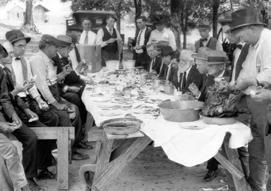
“Our purpose is very much still the same as it was when we originally started: To help farmers increase
profitability on their farms through education, research and marketing,” said Federation Executive Director Paul Pinyan.
That’s where the missions of Alfa and AU’s College of Agriculture, celebrating its 150th anniversary in 2022, have a natural overlap.

For more than 100 years, Alfa has supported Auburn — and the College of Agriculture in particular — through scholarships, fundraising, infrastructure, marketing and more. A physical sign of the support is evident at the Alfa Pavilion at Ag Heritage Park. The pavilion was originally designed to honor Alabama farmers and their contributions by providing a gathering space for activities and events at the state’s largest land-grant institution.
There are innumerable, intangible ways Alfa has worked in the college’s interest over the years. For example, the successful Boll Weevil Eradication Program wasn’t successful for free; Farm Bureau lobbied for those funds. It also had a hand in garnering support for the National Soil Dynamics Laboratory on Auburn’s campus. And longtime Federation President Edward Asbury O’Neal traveled to Washington, D.C., befriended President Franklin D. Roosevelt and had a major impact on developing New Deal farm policies.
“There are a number of challenges and opportunities we’ve taken on together,” Pinyan said. “We’re still doing this today. Now that looks like lobbying for space technology that benefits farmers, plant breeding, genomics
research and these kinds of things the government funds through the National Science Foundation.”
Alfa has supported College of Agriculture faculty research to improve profitability of the state’s farmers and has funded campus facilities for that work. The organization supports its Alfa Endowed Scholar, Dr. Mykel Taylor, an ag economist.
The Federation also had a hand in helping bring Auburn’s livestock judging team back to campus after a decades-long hiatus.
College of Agriculture Dean Paul Patterson said the support Alfa provides is vital to the college’s success.
“Auburn’s College of Agriculture and the Alabama Farmers Federation have very similar missions in serving the farmers and agricultural communities of our state, so we have been close partners over the past century,” Patterson said. “Throughout its history, Alfa has been vital to this state through its support, outreach and advocacy for farms, farming families and rural communities. We are proud to share so much of our history with them.”
Pinyan said his hope for the relationship between the two entities over the next 150 years is “to continue the common vision.”
“We need to continually position our farmers to compete in global markets during trying times,” he said. “We have challenges ahead of us, and Alabama farmers are looking to the experts at the college to help them be competitive and thrive.”
In the 1920s, Auburn University and Alabama Extension staff helped form and grow what is now the Alabama Farmers Federation.
Alabama Farm Bureau members held a barbecue in 1925. Today, members still break bread with each other and agency partners during meetings.
On the campus of Auburn University in 1921, Alabama Extension Director Luther Duncan helped form the Alabama Farmers Federation, which is now 340,000 members strong.
14 | NEIGHBORS | December 2022 alfafarmers.org
February 20-22, 2023
Embassy Suites by Hilton Birmingham, AL
3-day LIVE Workshop
• Are you ready to jumpstart your succession planning process?
• Is it time to set goals for yourself and your operation?
• Do you need to build the foundation of a comprehensive succession plan?
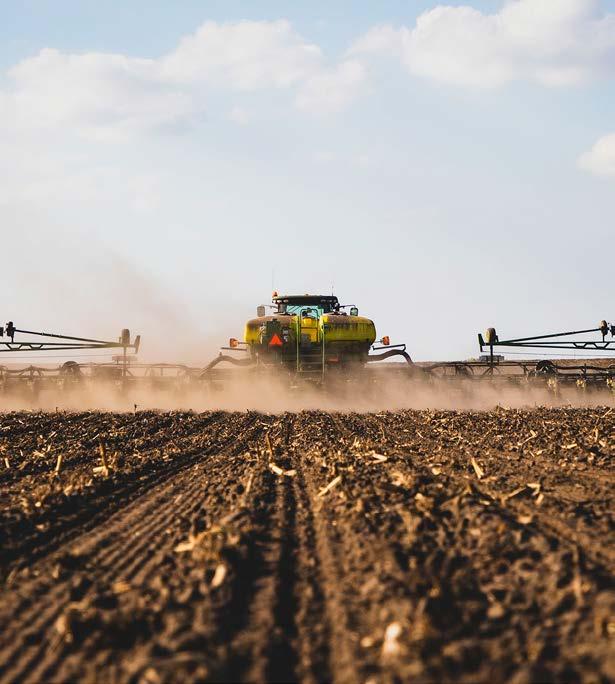

• Is your family suffering from disharmony?

If you answered “yes” to any of these questions, join Transition Point Business Advisors for their succession planning event, The DIRTT Project LIVE!®


The event, which will span three interactive days, is combined with a 60-page workbook with 21 tools and worksheets, as well as 32 online instructional videos. Instructors will focus on “how” to navigate through the components and decisions that are required as well as how to manage the challenges of keeping their teams and families aligned.
Tuition: $395 Using Promo Code: SPONSOR1 and includes: • Lifetime access to The DIRTT Project® online. • Participation in 5 months of group accountability ZOOM calls facilitated by a DIRTT Project LIVE! Instructor.
-Powered by-
Learn more and register at www.TheDIRTTProject.com
Signature Sponsor

Alabama Teen Wins World Barrel Racing Title
 By Marlee Moore
By Marlee Moore
2022 was a banner year for 18-yearold Noah Mills.
He and bay quarter horse Deuce clocked 14.6 seconds to snag first place in the National Barrel Horse Association (NBHA) Teen World Championship —

scoring an engraved belt buckle, big check and bragging rights.
Months earlier, Noah and Central High School baseball teammates won the state championship days before graduation.
“Talk about a big year,” Noah said with a grin.
Noah’s run to the 2022 championship began in 2021. Racers must attend three-plus NBHA-affiliated shows (or purchase a wildcard) to qualify, earning points as they go.
Once at the championship in Perry, Georgia, 1,200 teen competitors have two tries to make the finals. The top 25 in each of five divisions make the final run, and divisions are split in half-second increments, which are measured off the fastest time.
Noah qualified for the finals, ranking 23rd in the second division with a 15.2. The day’s fastest time was 14.5.
“I knew I could do it,” Noah said.
His mother, Laura, added, “There were people who had run faster but not on the day it mattered.”
In barrel racing, horses bolt into the arena, making a cloverleaf pattern around three barrels. Horse-rider connections are critical in the highly competitive event, with some horses pushing fast to get to each barrel, hugging it as they round the corner. Others need more space, making big passes around each barrel.
“Your timing has to be impeccable,”
Noah Mills and quarter horse Deuce bolted out of the gate to clock 14.6 seconds, and a first-place victory, in the National Barrel Horse Association World Teen Championship.
Russell County 18-year-old Noah Mills won the National Barrel Horse Association Teen World Championship earlier this year. He and parents Jerry and Laura live near Crawford.
alfafarmers.org December 2022 | NEIGHBORS | 17
Laura said. “You have to be bonded with your animal.”
The Millses, who live in Crawford, have traveled the show circuit for years, with Laura and husband Jerry attending dressage and show-jumping events before Noah was born. When he was a toddler, Noah started off riding ponies, eventually progressing to Deuce, who measures 16.2 hands.
At a solid hand, or 4 inches, over most barrel-racing horses, Deuce complements Noah’s 6-foot-2-inch
frame. Males and females compete in NBHA’s adult, teen and youth divisions (youth are 12 and under), while rodeo barrel racers are solely female.
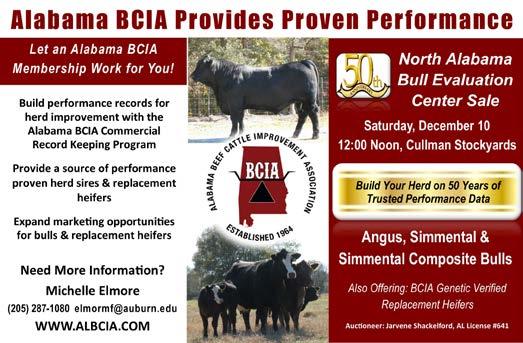
The Millses have formed deep friendships through barrel racing and fellowshipping at cowboy church services during contests with folks like Kim and Phil Slay of Chambers County. Their daughter, Audra, competed before aging out this past year.

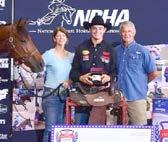
“We’re proud to have a world champion from small-town Alabama,”
Phil said. “Noah put in the hard work, and it paid off. Horses can be expensive, but it’s really a family sport. We travel to these events as a family and are thankful to make life-long friends like Laura, Jerry and Noah.”
In barrel racing, the slowest contestants lead off the finals, ending with the fastest previous competitor.
After Noah’s 14.6 run, nearly 80 horses remained. The Millses led Deuce to his stall and were surrounded by family and friends during the tense hour till the final horse entered the ring.
“I told myself, ‘If it’s meant to be, it’ll happen,’” Laura said. “It was too nerve-wracking. I brushed the horse, cleaned the stall, tried to stay busy. I cried when it finally happened.”
The closest times were 14.7 and 14.9 seconds.
“We’ve always known Deuce had the potential and ability,” Laura said of the former track horse. “We’re just your regular working-class people. I have a retired budget. I’ve always told Noah that if we win anything, we’re ahead. We do this because we love it and for our own fulfillment.”
Noah Mills won first place in the 2022 National Barrel Horse Association Teen World Championship.
18 | NEIGHBORS | December 2022 alfafarmers.org
The Millses have competed in horse shows and competitive events for decades, netting an impressive collection of belt buckles.

Alfa® delivers on the promise to serve, whether responding to claims or just helping our neighbors.

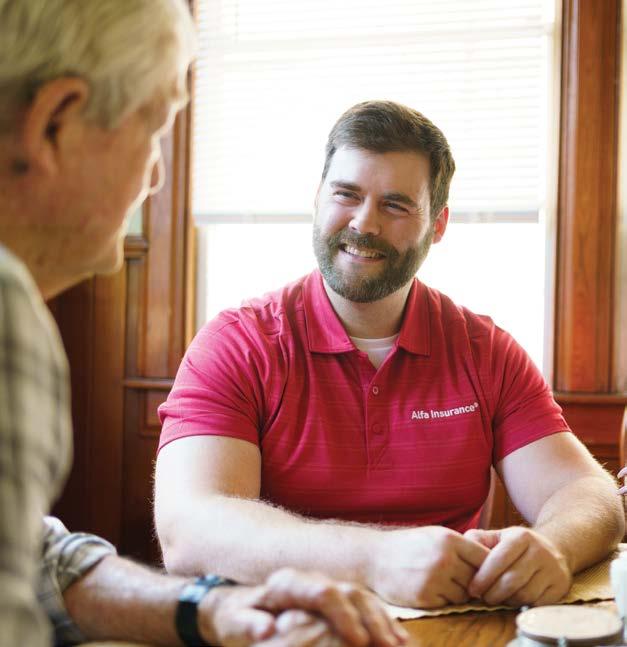
Communities are built by those who work TOGETHER.
AlabamaFarmersFoundation.org


The Alabama Farmers Agriculture Foundation (AFAF) partnered with county Farmers Federations to distribute more than $140,000 in scholarships to over 80 Auburn University (AU) students during a reception at Lazenby Farms in Auburn Sept. 26. From left are AU College of Agriculture Dean Paul Patterson, AU College of Agriculture Associate Dean Amy Wright, AU sophomore Kameria Doss of Pickens County, Alabama Farmers Federation President Jimmy Parnell, and Federation Central Area Vice President and AFAF Scholarship Committee Chair Jon Hegeman. The Federation has awarded scholarships to AU students since 1983.

Young Farmers Golf Tournament
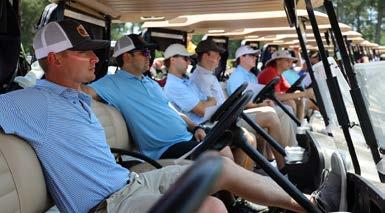
board of directors
alfafarmers.org December 2022 | NEIGHBORS | 21
2022 annual Report Our Mission Support Ag Education. Purchase an Ag Tag today!
“To support and advance agriculture in the state of Alabama through education and research; increase awareness of agriculture in Alabama through public programs and activities; improve and expand agricultural services and products for the benefit of all citizens and to establish and maintain high standards in agriculture.”
•
•
•
Jimmy Parnell
•
Rhonda Hughes
Phillip Johns
Lester Killebrew
Keith McCurdy
•
•
Cheryl Mitchell
Paul Pinyan
Mahlon Richburg
•
Raleigh Wilkerson
Foundation Scholarships
Capitalizing on the popular Foundation Skeet Shoot, the Alabama Farmers Federation State Young Farmers Committee hosted its inaugural Young Farmers Golf Tournament. The event, held in Montgomery May 16, sold out during its first year and raised funds to support ag education. The committee competed to sell the most sponsorships, with Ben Johnson of Randolph County taking home the Golden Club.



22 | NEIGHBORS | December 2022 alfafarmers.org
aitc mini grants Alabama
From Garden To Table
Amanda Daigle
Foley Elementary School, Baldwin County Chicken Raising Project
Lisa Ann Stradley
Foley Elementary School, Baldwin County Lion’s Land Grows Greenhouses
Shannon Keenan
Foley Elementary School, Baldwin County Tower Gardening Essentials Project
Kimber Fant
Eufaula Elementary School, Barbour County Tigers On Track
Meredith Campbell Eufaula High School, Barbour County
Bee Kind To Insects…
Agriculture Depends On Them
Amy Burgess
Blount County Extension Ag With Arrington
Shana Arrington
Fairfax Elementary School, Chambers County
Honeybee Education
Jennifer Gann Cleburne County 4-H
Raised Bed Irrigation
Rachel Dawsey
North Alabama Agriplex, Cullman County Classroom Garden Supply Project
Arielle Hooks Dale County 4-H
Constructing Fishing Rods
Adam Amos Crossville High School, DeKalb County
Ag In The Classroom awarded 33 mini grants for agricultural education totaling $15,553.68.
Little Hands, Little Garden Laurie Weldon
Wetumpka Elementary School, Elmore County Chicken Hatching Project
Andrew Palmer
Holtville High School, Elmore County School Cooperative Greenhouse Project
Amy Gattis
Union Homeschool Cooperative Teacher, Jefferson County
The Gardening Rebels
Lauren Vernon
Vestavia Hills High School, Jefferson County
Tool For Life Montessori Skill Boards
Julie Lane
Forest Hills Elementary, Lauderdale County Butterfly Garden
Jennifer Corbett
Glenwood School, Lee County
Outdoor Sensory Classroom Kelli McMurray Glenwood School, Lee County 4th Grade Classroom Gardening Gina Nimmo
Lee County Extension
Ag Educational Teaching Kits
Rebecca Danley Marion County 4-H
Science Seeding Supply And Garden Project
Katherine Parham
Brilliant Elementary School, Marion County Little Tiger Fruit And Pollinator Garden Angela Miles
Brilliant Elementary School, Marion County
AFAF Contributions & sponsorships
Alabama 4-H Foundation
Alabama Agribusiness Council
Alabama Association of Conservation Districts
Alabama Association of County Agricultural Agents and Specialists
Alabama Association of Extension 4-H Agents
Alabama Association of RC&D Councils
Alabama FFA Foundation
Alabama Fruit & Vegetable Growers Association
Alabama High School Rodeo Association
Alabama Junior Cattlemen’s Association
Alabama Little Britches Rodeo
Alabama Master Gardeners Association
Alabama National Fair
Alabama Natural Resources Council
Alabama Nursery & Landscape Association
Alabama Quarter Horse Association
Alabama Turfgrass Association
Auburn University (AU) Beef U
AU College of Agriculture
AU College of Forestry, Wildlife & Environment
AU Collegiate Cattlemen & Cattlewomen
AU Dairy U
AU Department of Animal Sciences
AU Department of Horticulture
AU Foundation
AU Horse U
Barbour County Extension Office
Calhoun County Fair
Catfish Farmers of America
Central AlabamaWorks!
Communications Officers of State Departments of Agriculture
East AlabamaWorks!
School Garden Seeding Project
Jessica Emerson
Hackleburg Elementary School, Marion County
Pharmacy Construction Project
Ally Taylor
Hamilton High School, Marion County
Pollinator Friendly Garden
Amanda Stidham
Hamilton Elementary School, Marion County
Grow Your Own Garden
Rachel Nelson
Project



Hamilton Elementary School, Marion County Let It Bee
Donna Hill
Phillips High School, Marion County
Outdoor Classroom Building Project
Misty Trussell
Dalraida Elementary School, Montgomery County Building A Community
Leslie Alexander
Talladega County Career Tech School, Talladega County
Community Garden
Dianne Williams
Cordova Elementary School, Walker County
Ag Construction Student Project
Billy Dill
Dora High School, Walker County
STEM Garden Project
Whit Tucker
Jasper Junior High School, Walker County
Aeroponics System Project
Dylan Gilbert Winston County 4-H
FFA Steer & Heifer Show
Georgia Peanut Commission
Leadership Alabama
National Association of State Departments of Agriculture
National Peanut Festival Association
North Alabama Agriplex Foundation
North AlabamaWorks!
Panhandle Youth Expo
Pike Road High School
Russell County Stampede Rodeo
SAWDC AlabamaWorks!
Southeastern Livestock Exposition
Sunbelt Ag Expo
UAB School of Medicine Rural Medicine Program
West AlabamaWorks!
Woodland Show Club
alfafarmers.org December 2022 | NEIGHBORS | 23
AGR Educational Foundation
Alabama Cooperative Extension System, Barbour County Office
Alabama Peanut Producers Association
Alabama 4-H Club Foundation Inc.
Alabama Ag Credit
Alabama Angus Association
Alabama Catfish Producers
Alabama Cattlemen’s Foundation
Alabama Farm Bureau Services Inc.
Alabama Farm Credit
Alabama Farmers Cooperative Inc.
Alabama Farmers Federation
Alabama Farmers Federation, Dairy
Alabama Farmers Federation, Pork
Alabama Fruit & Vegetable Growers Association
Alabama Pork Producers
Alabama Power Co.
Alabama TREASURE Forest Association
Alabama Wheat & Feed Grain Producers
Albert Martin
Alfa Foundation
Alfa Mutual Insurance Co.
Alfa Services Inc., Health
Andrew Wendland
Archer-Daniels-Midland Co.
AT&T
Auburn University
Autauga County Farmers Federation
Baldwin County Farmers Federation
Barbour County Farmers Federation
Beck’s Turf Inc.
Beth Evans-Smith
Bibb County Farmers Federation
Blair Wyrosdick Farm Account
Blount County Farmers Federation
Blue Cross Blue Shield
Brandt Consolidated
Bullock County Farmers Federation
Burkes Mechanical Inc.
Butler County Farmers Federation
Calhoun County Farmers Federation
Chambers County Farmers Federation
Cherokee County Farmers Federation
Chilton County Farmers Federation
Choctaw County Farmers Federation
Choice Cotton Co. Inc.
Chris Langley
Clarke County Cattlemen’s Association
Clarke County Farmers Federation
Clay County Farmers Federation
Clay County Goat & Poultry LLC
Cleburne County Farmers Federation
Coffee County Farmers Federation
Colbert County Farmers Federation
Conecuh County Farmers Federation
Coosa County Farmers Federation
Cornerstone Government Affairs
Corteva Agriscience
Covington County Farmers Federation
Creative Consultants Inc.
Crenshaw County Farmers Federation
Cullman County Farmers Federation
Cynthia Thompson
Dale County Farmers Federation
Dallas County Farmers Federation
David W. Downey, Dal-Dav Charolais
DeKalb County Farmers Federation
Denali Water Solutions LLC
Dustin Retherford
Elmore County Cattlemen’s Association
Elmore County Farmers Federation
Ernst & Young
Escambia County Farmers Federation
Etowah County Farmers Federation
Fayette County Farmers Federation
First South Farm Credit
Franklin County Cattlemen’s Association
Franklin County Farmers Federation
Fuller Supply
Geneva County Farmers Federation
Glenda and Kenneth Walker, Walker Family Simmental
Goodway Refining LLC

Greene County Farmers Federation
Greenway Plants Inc.
Hale County Farmers Federation
Henry County Farmers Federation
Houston County Farmers Federation
J & R Feed Service, Stephen Donaldson
Jackson County Cattlemen’s Association
Jackson County Farmers Federation
Jackson Thornton & Co., P.C.
James L. Hinton Jr.
James L. Parnell
Jeff & Kay Peek
Jeff Helms
Jefferson County Farmers Federation
Jonathan Gladney
Julie Parish
Lamar County Farmers Federation
Lauderdale County Farmers Federation
Lawrence County Farmers Federation
Lee County Farmers Federation
Limestone County Farmers Federation
Lowndes County Cattlemen’s Association
Lowndes County Farmers Federation
Macon County Cattlemen’s Association
Macon County Farmers Federation
Madison County Farmers Federation
Marengo County Farmers Federation
Marion County Farmers Federation
Marshall County Farmers Federation
Max Bozeman
Mid State Stockyards
Mobile County Farmers Federation
Monroe County Farmers Federation
Montgomery County Farmers Federation
Morgan County Farmers Federation
National Pork Board
Nipcam Services of Alabama
Paul Pinyan
Perry County Farmers Federation
Phil Slay
Pickens County Farmers Federation
Pike County Farmers Federation
Poultry South
Priester’s Pecans
Randall Paramore
Randolph County Cattlemen’s Association
Randolph County Farmers Federation
Rhonda Hughes
Richard Hasty Meadows
River Bank & Trust
River Region Fence LLC
Russell County Cattlemen’s Association
Russell County Farmers Federation
Selwood Farm Inc.
Shelby County Cattlemen’s Association
Shelby County Farmers Federation
Southeastern Land Group Inc.
Southeastern Livestock Expo
St. Clair County Farmers Federation
State Department of Education, CTE/ Workforce Development
Sumter County Farmers Federation
Sweet Grown Alabama
Taber Ellis, 3-E Cattle Co.
Talladega County Farmers Federation
Tallapoosa County Farmers Federation
Tallapoosa County Soil & Water Conservation
The Bridge Builders of Alabama LLC, Tacky Farms
Thomas and Farrah Adams
Thorsby High School
Trantham Services Inc
Tuscaloosa County Farmers Federation
Walker County Farmers Federation
Washington County Farmers Federation
Wells Fargo
Wilcox County Farmers Federation
Wynlakes
By Mail: Make Checks Payable To: Alabama Farmers Agriculture Foundation, P.O. Box 11000, Montgomery, Alabama 36191 Name Address City State ZIP Phone Email In Memory / Honor Of: Gifts to the Alabama Farmers Agriculture Foundation are tax-deductible to the extent allowed by law. Questions? Contact Amanda Butts at (334) 612-5525 or abutts@alfafarmers.org. DONORS donate online at alabamafarmersfoundation.org 24 | NEIGHBORS | December 2022 alfafarmers.org


The Red Christmas Star Poinsettia
sleeve on the pot to decrease damage while transporting. If planning to leave the sleeve on the plant after arriving home, make sure there are drainage holes for watering.
When choosing the perfect place to display the poinsettia, remember to give the plant space. Overcrowding can damage the bracts. Avoid keeping the plant near heaters or cold drafty areas indoors, and ensure the plant is within its ideal temperature range of 65-75 F. If temperatures are below 55 F, protect the plant from the cooler weather.
Poinsettias need bright, indirect sunlight. Before watering the poinsettia, make sure the soil is dry to the touch. Water at the soil level and not over the leaves or bracts. Use a watering can, avoid using a hose and don’t let poinsettias stand in water. It is important not to overwater, only adding moisture to the plant when the soil is dry.
By Megan Jones
I
t’s getting chillier in Alabama! Aside from the weather, one thing that tells us the holidays are near is the flood of beautiful red poinsettias filling up local nurseries and home improvement stores.

The poinsettia has been used as a decoration since missionaries first included them in Advent ceremonies during the 17th century. Poinsettias, native to Mexico, were introduced in the U.S. in 1825 when the first U.S. Ambassador to Mexico, Joel Roberts Poinsett, was enchanted by the blooms
and sent some home to Greenville, South Carolina. In 1833, the plant was given its common name — poinsettia — after Poinsett.
After Christmas trees, the poinsettia is the ultimate holiday plant. The red bracts, usually mistaken for flowers, are leaves. These leaves are the reason poinsettias are known as the Red Christmas Star. Poinsettias come in various colors, including red, white, pink, corals, and variegated. While there are many color options, the traditional red is the most-purchased.

Caring for poinsettia plants is easy. After buying the plant, keep the plastic
To keep the poinsettia alive to use next holiday season, prune the plant to about 4 inches tall during April. Keep the poinsettia at a normal inside temperature and repot in a larger pot in May. Continue to water the plant when dry, and apply a household plant fertilizer every two weeks. When November comes back around, put the plant in daylight for 12 hours, then in a cool room with 12 hours of complete darkness. A cool room will encourage the bracts to flourish.
With these care tips under your belt, you’re ready to take care of your poinsettia during this holiday season and seasons to come.
26 | NEIGHBORS | December 2022 alfafarmers.org
Michaela Sanders: I am a fourth-generation dairy farmer. We reopened our doors in November 2017. We were formerly known as Lott Dairy Farm. We had a 12-year delay from the time my grandfather got out of the dairy business and us getting back in. Blue Ribbon Dairy was started on the foundation of letting people come to the farm and purchase milk we bottle here. The main reason we are here is to promote the dairy industry to consumers. We milk 32 cows, and we pasteurize our milk. It is non-homogenized, so the cream still rises to the top; then we bottle it.

It’s from the cow to the jug within 24 hours. We sell to about 22 different stores.
CC: Tell us a little bit about the milking parlor you have.
MS: My grandfather milked cows until 2005 in a flat barn that was built in 1947 by his dad. My great-granddad was the first Grade A dairy in Elmore County. My granddaddy was the last Grade A dairy when he went out in 2005, and now, we are the only Grade A dairy in the county. It’s neat I can say my great-grandfather was the first in the county, and we’re still going along today. It’s a lot of hard work, but I’m thankful for the foundation that was
built for me.
CC: You talked about hard work. Back during your granddaddy’s time, there were probably thousands of dairies in the state of Alabama. Tell us a little about why the dairy industry has declined. As of right now, there are 17 dairies in the state — 16 farm-owned and one at Auburn’s College of Veterinary Medicine. What are the biggest challenges that have impacted the dairy industry?
MS: The biggest challenge is labor. Dairy cows don’t take a day off. It’s a 365-day job, and these cows get milked twice a day. Cow care and cow comfort are important. It takes a while for someone to learn each cow. I think another thing is feed costs. It’s hard to grow a lot of feed because of our weather. Labor and costs of business have driven other farmers out of business.

Catch the entire interview on the Alabama AgCast. Subscribe wherever you listen to podcasts or visit AlfaFarmers.org/agcast. New episodes available every Wednesday.
 Colton Christjohn: Tell us a little bit about Blue Ribbon Dairy and how you got started.
Enjoy this excerpt from an Alabama AgCast featuring Alabama Farmers Federation Dairy Division Director Colton Christjohn and Blue Ribbon Dairy owner Michaela Sanders, whose dairy bottles milk and makes fresh ice cream.
Christjohn Sanders
Colton Christjohn: Tell us a little bit about Blue Ribbon Dairy and how you got started.
Enjoy this excerpt from an Alabama AgCast featuring Alabama Farmers Federation Dairy Division Director Colton Christjohn and Blue Ribbon Dairy owner Michaela Sanders, whose dairy bottles milk and makes fresh ice cream.
Christjohn Sanders
alfafarmers.org December 2022 | NEIGHBORS | 27
Sponsored By Alabama Ag Credit




Rent with Confidence and Enjoy Great Rates Every Time you Rent. Log-in to your account to book now! | AlfaFarmers.org/perks ©2022 Enterprise Holdings, Inc. K06743 1.22 28 | NEIGHBORS | December 2022 alfafarmers.org
Simply Southern Spotlight
Litter Gitter Clears Waterways

rowing up in Hammond, Louisiana, a young Don Bates entertained himself by wading through creeks and drainage ditches in search of crawfish, turtles, frogs and other water-loving creatures. As an adult, he developed a passion for protecting and conserving waterways, which led to creating the Osprey Initiative. Bates’ company offers contracts to install and maintain his invention — the Litter Gitter.
GDon Bates’ invention, the Litter Gitter, collects trash in waterways, including unique rubbish.
Stations and Times

Saturday, Central Time
Market Station Time
Columbus, Ga. WLTZ 38 5:00 PM
Sunday, Central Time
Mobile WPMI 15 6:00 AM
Birmingham WBMA 33/40 6:30 AM
Huntsville WAFF 48 9:00 AM
Montgomery WAKA 8 10:30 AM
Dothan WTVY 4 10:30 AM
RFD-TV: Wednesdays • 3 p.m. Central
ALWAYS ON: SimplySouthernTV.net
What is the Litter Gitter. How does it work?
Don Bates: The device looks similar to a small-scale pontoon boat. There’s a basket at the base and two booms connected to each bank of the waterway. As litter comes down with the current, it bounces along those booms and gets trapped in the basket while the water continues to flow.
What happens next?
DB: A Litter Gitter is high maintenance, so instead of selling the devices, we sell contracts. Our crews check and clean the Litter Gitters at least twice monthly and within 48 hours of a rain. We get enough volume of plastic bottles and aluminum cans that we’re able to separate those out for recycling, and we’ve started recycling glass locally. By volume, about 30% of what we capture is recycled.
Simply Southern’s segment about this story airs on broadcast stations Dec. 10 and 11 and on RFD-TV Wednesday, Dec. 14, at 3 p.m. Central. For more information, visit SimplySouthernTV.net.
DB: We’re based in Mobile. In Alabama, we’re working on waterways in and around Mobile, Birmingham and Decatur. We’ve also installed Litter Gitters and other litter collection devices in more than 10 states.
Have you gotten feedback from folks after
DB: At Maple Street Tributary in Mobile, where we installed our first Litter Gitter, I ran into a dad with his two kids. He told me they love to feed the turtles there now that the litter is gone, and his kids told me about the different fish they’ve seen. In Prichard, I’ve had elderly folks tell me they remember people being baptized in the creeks we’re helping clear out now, and they’re grateful their grandkids can now wade in those same creeks. Those stories are the ones that give you goosebumps — when you know you’re playing a part in those kinds of stories.
Obviously, y’all are reducing litter, but how can regular folks help in the fight to control litter?
DB: We play a small role in litter control. It really takes a lot of partners working together. It’s important to remember our stormwater, for the most part, is not treated. Any piece of litter in a parking lot, yard or drainage ditch is going to end up in our big water, such as creeks, rivers and bays. It’s much easier if you remove that litter when you see it rather than fishing it out of the middle of Mobile Bay after a rain. And get involved in neighborhood cleanups. There are tons out there.
 Simply Southern TV is sponsored by
Simply Southern TV is sponsored by
The Litter Gitter is one part of the Osprey Initiative. Where does your company operate?
you’ve installed one of these?
&
Grain Checko
Wheat
Feed
Catfish Checko Soybean Checko
alfafarmers.org December 2022 | NEIGHBORS | 29
The Grass Is Always Greener In Jordan-Hare
By Katie Nichols
Bermudagrass in the front yard may be turning brown, but the grass is still green on Auburn University’s Pat Dye Field in Jordan-Hare Stadium. It may also be greener in the neighbor’s yard if they decided to overseed with perennial ryegrass.
In the fall, Alabama golf courses, athletic fields and even lawns are overseeded with perennial ryegrass as Bermudagrass turf begins dormancy.
Alabama Extension Turfgrass Specialist David Han works closely with the team of field specialists that maintains Pat Dye Field, including field manager Eric Kleypas. Han said overseeding is done for two reasons: aesthetics and Bermudagrass protection.
“In the late fall, Bermudagrass fields go dormant and start to turn brown,” Han said. “On football fields, you can overseed to protect dormant Bermudagrass, but it also provides pleasant color year-round.”
Kleypas said when temperatures cool and daylight shortens, it’s time to overseed Pat Dye Field with perennial ryegrass.
“The cool-season grass has a nice dark color and is pretty on television and for the fans, but most importantly, it
gives us stable, consistent athletic fields for our student-athletes,” Kleypas said.
Kleypas works closely with Han throughout the year, especially during football season.
“We work with the Extension System, not only for overseeding practices, but to get a feel for what is happening throughout the state,” Kleypas said. “We can forecast through Dr. Han what kinds of pest and disease pressures to expect.”
texture, dark green color and disease tolerance.
“Perennial ryegrass can tolerate mowing heights less than half an inch and creates attractive stripes when maintained with a reel mower or rotary mower with rollers,” Lawrence said.
Timing varies widely, but perennial ryegrass seed is typically spread in September and October.
“It’s important to maintain adequate soil moisture during the first few weeks after seeding to ensure good seed germination and prevent seedling desiccation,” Lawrence said. “Areas with a dense Bermudagrass canopy may benefit from vertical mowing prior to overseeding.”
Most homeowners don’t tend to overseed routinely. Han said overseeding at home is strictly visual.
“We can usually get ryegrass to germinate in Auburn through at least the first couple of weeks in December,” Han said. “We actually have growth blankets to cover the field in JordanHare Stadium. These blankets keep the soil temperature up to aid in germination.”

David Lawrence, a commercial horticulture regional agent, said perennial ryegrass is superior to annual ryegrass because of its fine
However, there are those whose hobby is caring for their lawn. In that case, the biggest factor to consider, aside from maintenance, is whether to plant annual or perennial ryegrass. While perennial is longer lasting, finer and darker green than annual ryegrass, it is also more expensive. Homeowners should weigh the costs before deciding which to plant.
Han said one of the best things about overseeding in Alabama is the long period of great growing weather for ryegrass in the fall.
30 | NEIGHBORS | December 2022 alfafarmers.org


alfafarmers.org December 2022 | NEIGHBORS | 31
Family Support Strong During Livestock Shows

animals and grooming them for peak performance.
Beef Cattle Show judge Taylor Farrer of Indiana commended Alabama exhibitors on their daily practice.
“The cattle project, in my opinion, is one of the hardest projects kids can undertake,” Farrer said. “You can’t skip a day when you have livestock at home. It shows when you haven’t put time into these cattle.”
An all-in feeling flows through livestock barns outside Garrett Coliseum as youth and their support systems groom animals to enter the ring. In market or breeding animal shows, livestock are judged on structure, soundness and strength, while showmanship tests competitors’ skills.
As youth and livestock enter the ring, spectators flood the stands, where they anxiously watch for the final line-up or give gentle guidance from afar.
Farm families split responsibilities during show season, often leaving members at home or dispersed across the state managing farm business.
By Marlee Moore
Just outside the ring where youth exhibit meticulously groomed livestock, family and friends cheer on their loved ones — and lend support when the showing gets tough.
“These kids think nothing about getting up and going again when they get knocked down,” said Cameron Price, whose niece, Brooklyn, showed beef cattle during the Alabama National Fair Oct. 8-9. “You learn how to be tough. You learn about life and responsibility.”
The Alabama Farmers Federation and Alfa Insurance annually sponsor beef, dairy, goat, sheep and swine shows at the Alabama National Fair, one of many fairs supported by the state and county Farmers Federations each fall.
Before hitting the circuit, families
spend months preparing.
Take the Prices.
Together, they select genetics for Brooklyn’s livestock projects, a choice ultimately impacting their overall herd. Decisions are made by patriarch State Sen. Randy Price, R-Opelika, and wife Oline; sons Cameron and Hunter; daughter-in-law Lisa; and Brooklyn. The fourth-grade student at Beauregard Elementary School has a 3-year-old brother, Walton, who is destined for the ring, too.
“When our cows have calves, I’m happy because they could be my new show calves,” said Brooklyn, 9.
Brooklyn and fellow exhibitors spend months working with their cattle, getting comfortable with the
“While we’re here, we have guys at home feeding our cattle herd,” Cameron said. “On one end of the state, we’re in Montgomery showing cattle,
selling cattle hours away. It does take a village.”
Cameron showed cow-calf pairs with his dad, making Brooklyn — the Alabama National Fair junior reserve champion showman — the third generation of exhibitors. She’s the seventh generation on their farm.
“We’re trying to build a herd for her,” Cameron said, nodding to his niece. “We want animals that are functional. Even our show cattle need to be functional and need to perform once they’re done with the show.”
View Alabama National Fair livestock show photos on the Federation’s Flickr page.

and then we have family members
32 | NEIGHBORS | December 2022 alfafarmers.org
Above: Brooklyn Price showed cattle during Alabama National Fair youth livestock shows. It’s a family affair for the Prices, with support and help spanning three generations of family members. Right: Beginner Goat Show exhibitors received tips and tricks from judge John Tart of North Carolina.














Certificate of Deposit (CD) Specials CELEBRATE YOUR RATE Sit back, relax, and grow your funds in a Farm Bureau Bank® CD Special! Make the most out of your deposit! Farm Bureau Bank o ers CD Specials with assorted terms, competitive rates, and guaranteed returns. Contact your local Alfa Insurance agent for our current rates and apply today! Minimum initial deposit of $1,000. Federal withdrawal restrictions apply. The APY assumes interest remains on deposit until maturity and a withdrawal will reduce earnings. Fees could reduce earnings on the account and a penalty will be imposed for early withdrawal. The Bank reserves the right to limit deposits taken under this program. See complete terms and conditions at www.farmbureau.bank. Banking services provided by Farm Bureau Bank, FSB. Farm Bureau, FB, and the FB National Logo are registered service marks owned by, and used by Farm Bureau Bank FSB under license from, the American Farm Bureau Federation. 09.2022 farmbureau.bank • 800.492.3276 Flexible Growth Terms Starting at 7 Months Low Initial Deposit FDICInsured
The rehabilitation center is a nice nursing home. Not fancy. The cafeteria is like any other. White walls. Fluorescent lights.
It’s bingo day. You can smell excitement in the air — or maybe that’s meatloaf. The residents in wheelchairs are ready to play.
There isn’t a single strand of brown hair in this room. Except for Railey’s.
Railey is calling bingo numbers over a microphone. She’s 17, all-American.
She aced her ACTs, plays volleyball, wants to be an engineer and is sharper than a digital semiconductor. She’s going places. Like nursing homes.
“B-4,” Railey calls.


“Railey comes here a lot,” her mother says. “She rides her truck up here all the time.”
Railey has no relatives here.
The first time she visited, she was 10, delivering Christmas gifts. It was her idea. She left packages for people she worried the world had forgotten.
By age 11, Railey was speaking at church services, suggesting folks visit the elderly more often.
“I pretty much guilt-trip them,” Railey said. “Just trying to get ’em to donate. I gotta do what works.”




It works. She’s been delivering holiday packages to five area nursing homes. Her gift-giving operation grew so big her stepfather bought an enclosed trailer to stockpile presents.
“You’d be surprised at simple things these folks want. Lipstick, perfume,

DVDs. Once, someone wanted cheese balls," her mother said.
“N-42,” says Railey.
“BINGO!” a woman yells. False alarm.
“There was this old lady,” says her mother. “She was a Mickey Mouse fanatic.”
Railey visited her a lot. They became friends. They talked about anything and everything. They exchanged smiles. Stories. Hugs. Railey visited the woman on Mickey's birthday. She bought the woman a Mickey watch. The lady nearly lost her mind.
“Railey loved her,” her mother goes on. “They just connected, you know.”

On her next visit, Railey brought another bagful of gifts. No sooner had she entered the nursing home doors than she knew something was wrong.
The old woman passed a few days earlier. It devastated Railey. They buried the woman with that watch.
“G-50,” says Railey. “BINGO!”
The room applauds.

Before I leave, I give Railey a hug. I try not to interrupt her. She’s too busy with official gaming responsibilities. She’s smiling at a white-haired woman.
I wish you could see how the woman is grinning back at her. The look says more than I am able to write.

“Hey,” Railey whispers. “Thanks for hanging out today.”
Sure thing, Railey. And thank you for changing the world. ■
ANGEL
Columnist and novelist Sean Dietrich shares tales of common people, the human spirit, traditional regional music and life in the American South through his podcast series at SeanDietrich.com. Knight’s Rooftop Painting CULLMAN, ALABAMA 256-338-4721 SERVICE PROVIDED Rooftop painting of n Chicken houses n Barns n Mobile homes n All metal roofs I use a special heavy-duty, asphalt-based aluminum paint that makes an old roof look like new and helps prevent future rusting. FREE ESTIMATES Give me a call! AFTER BEFORE alfafarmers.org December 2022 | NEIGHBORS | 35
The smells of fall baking have been replaced by peppermint and chocolate at my house as holiday treat season is underway! There is nothing I love to give more than treats from my kitchen. Each year, I pull out my well-worn family favorite recipes and add one or two new ones into the mix. This month, I’m sharing two tried-andtrue treats and a special bonus from a beloved Alabama Farmers Federation cook.
Despite traditional fruitcake being frowned upon by many, fruitcake cookies are a shining star on any holiday cookie platter. In fact, this is one of my most requested holiday recipes. While most fruitcake cookies call for shortening, I like to use butter to add a more homestyle flavor. Mix that with the best candied fruit you can find, and you’re sure to win over even the most stalwart fruitcake haters.
I prepare and package countless batches of peanut brittle each Christmas. It’s the perfect make-ahead gift folks across generations are delighted to receive. Microwave Peanut Brittle tastes just like my mom’s old-fashioned recipe but incorporates using a microwave for far less fuss.
Last, but certainly not least, I’m honored to share a recipe from Federation member Linda Finney, the organization’s former Alfa Health manager. Finney and her family hail from Elmore County, where her Cracker Brittle, originally shared in the December 1997 Neighbors, is the stuff of legends. Chances are you’ve had some version of this before. If you haven’t, it’s popular for a reason, so get ready to be impressed. Sweet toffee is baked onto saltine crackers that are then topped with chocolate. That sweet and salty combo gets me every time.

Cracker Brittle
By Linda Finney, Elmore County
Prep Time 20 mins Cook Time 10 mins
Ingredients
40-50 saltine crackers
1 cup butter
Makes
40 to 50 pieces
1 cup firmly packed light brown sugar
2 cups (12 ounces) chocolate, butterscotch, peanut butter or vanilla morsels
Instructions
Heat oven to 400 F. Line jellyroll pan with heavy duty aluminum foil. Lightly spray foil with nonstick cooking spray. Place saltines in a single layer on the foil.
In a saucepan over medium-high heat, bring butter and brown sugar to a boil and cook, stirring constantly, for 3 minutes once bubbles form. Drizzle over saltines.
Bake at 400 degrees for 5 minutes or until bubbly. Remove from oven and immediately sprinkle with morsels, using a spatula to spread melting chips. Cool in refrigerator. Peel crackers from foil and break apart. Store in an airtight container in the refrigerator.


I hope you have a delicious holiday season with lots of memory-making in store. You know, I always say we Southerners have a special way of telling folks we love them: We cook for them. And the holidays are the perfect opportunity to share that love. May the warmth of your heart be rivaled only by the warmth of your kitchen.

Merry Christmas, y’all.
Stacey Little is a foodie, recipe developer and cookbook author whose Southern Bite blog helps families put simple, down-to-earth food on the table while preserving Southern cooking for future generations. See more recipes at southernbite.com.
36 | NEIGHBORS | December 2022 alfafarmers.org
Old-Fashioned Fruitcake Cookies

Prep Time Cook Time Makes
5 mins 25 mins 4 dozen
Ingredients
1/2 cup unsalted butter, room temperature
3/4 cup sugar
1 large egg
1 teaspoon vanilla extract
1/2 teaspoon almond extract
1/4 teaspoon lemon extract
1 1/2 cups all-purpose flour
1/2 teaspoon salt
1/2 teaspoon baking soda
RecipeStacey’sNotes
If you find the cookies spread too much, a 30-minute rest in the fridge before baking helps. Keep the dough chilled until you scoop it out onto the cookie sheet.
1 cup diced candied pineapple
1 cup diced candied red cherries
1 cup diced candied green cherries
1 cup coarsely chopped pecans
Instructions
Heat oven to 300 F and line a cookie sheet with a silicone mat or parchment paper. Set aside.
Use a mixer to cream butter and sugar until fluffy. Add egg, vanilla extract, almond extract and lemon extract; mix well.

In another bowl, whisk together flour, salt and baking soda. Gradually add flour mixture to butter mixture and mix well. Fold in candied fruit and pecans.
Drop dough by heaping tablespoonfuls onto the prepared cookie sheet about 3 to 4 inches apart. Bake 20 to 25 minutes or until just golden brown. Allow to cool about 5 minutes on the baking sheet before transferring to a wire rack to cool completely. Store in an airtight container for a few days or in the refrigerator for longer. Cookies can be wrapped tightly and frozen for a few months.
Microwave Peanut Brittle

Prep Time Cook Time 5 mins 9 mins
Ingredients
1 cup sugar
1/2 cup light corn syrup
1 1/2 cups raw peanuts
1 tablespoon unsalted butter
1 teaspoon vanilla extract
1 1/2 teaspoons baking soda
Instructions
Line a large baking sheet with aluminum foil, and spray with nonstick cooking spray. Set aside.
In a large microwave-safe glass bowl, stir together sugar and corn syrup.
Microwave the mixture 4 minutes. The sugar will boil. Carefully add peanuts and butter; use a heatproof utensil to stir to combine.
Return bowl to the microwave and cook an additional 3 to 5 minutes or until caramel colored. The mixture will need to reach 300-310 F, the hard crack stage.
Remove from microwave. Add vanilla and baking soda, and stir quickly to combine. The mixture will foam up. Stir just enough to get all the baking soda combined, but don’t over stir. The foam gives the brittle a lighter honeycomb texture. Stirring too much will work out all those bubbles.
Quickly and carefully pour mixture onto the prepared pan. Use a silicone spatula sprayed with nonstick cooking spray to spread brittle evenly. Allow to cool completely before breaking into pieces. Store in an airtight container.
Stacey’s Recipe Notes
Different wattage microwaves take varying amounts of time. I used a 1650-watt microwave to develop this recipe. This variance will happen in the last cooking after you’ve added the peanuts and butter. I recommend having a candy or instant-read thermometer to ensure the sugar mixture gets to 300-310 F. This hard crack stage in candy making will give you the crunchy sugar texture you want.
alfafarmers.org December 2022 | NEIGHBORS | 37
You’re where the rubber meets the road. And the engine. And the interior. All soybean farmers, including you, are busy replacing petroleum with your soy oil. How? By pooling your resources through your soy checkoff. Learn how your soy checkoff is bringing tangible returns back to you and your operation at unitedsoybean.org/hopper.
Moving Soy Forward. Moving You Forward.

( YOU )
©2021 United Soybean Board [61078-10 9/21]


























































 By Maggie Edwards
By Maggie Edwards

















 By Marlee Moore
By Marlee Moore















 Colton Christjohn: Tell us a little bit about Blue Ribbon Dairy and how you got started.
Enjoy this excerpt from an Alabama AgCast featuring Alabama Farmers Federation Dairy Division Director Colton Christjohn and Blue Ribbon Dairy owner Michaela Sanders, whose dairy bottles milk and makes fresh ice cream.
Christjohn Sanders
Colton Christjohn: Tell us a little bit about Blue Ribbon Dairy and how you got started.
Enjoy this excerpt from an Alabama AgCast featuring Alabama Farmers Federation Dairy Division Director Colton Christjohn and Blue Ribbon Dairy owner Michaela Sanders, whose dairy bottles milk and makes fresh ice cream.
Christjohn Sanders





 Simply Southern TV is sponsored by
Simply Southern TV is sponsored by































